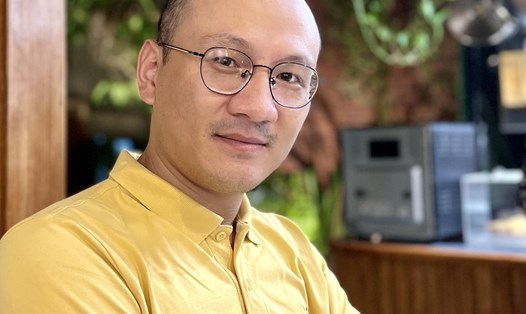1. Unexpected
A misconception about an object that is not actually such.
In life, we often wonder about things outside of us, different from us. That always exists as a rule.
But one day, we suddenly realize that what we thought belonged to us, was within us, what we inherently had, what we were familiar with.
It's not easy to get to that day.
2. Two numbers said
With the words "Say", Phan Dang chose two important moments in life to talk about the change of perception.
At the age of twenty, Phan Dang “thought he was living in reality” with his entire life being “to die in the most basic image of a person and always embellishing and being proud of that”. Those “deaths” did not need to be “adorned” or “proud” to also implicitly contain affirmation.
At thirty-nine years old, Phan Dang suddenly realized that “people” was just a concept and he “began to let go of concepts”. The truth will have another Phan Dang, not simply renewing himself at the present moment. The change in perception is like a fork in the road Phan Dang chose in his life. Therefore, this door will open nineteen years of looking out at the world and looking inward. Between the two looks, a heart is light.
Phan Dang was right next to me and joked: "Funny huh" as if to say, it was all just a game. Yet behind that smile, the light of philosophy was shining and shining.
3. Phan Dang Raindrops
Entering Phan Dang's world, we encounter a view projected outward, encompassing real life. There are people and rain. Raindrops erase people when they "enter life", "enter heaven". Rain also erases people when they "leave life", "leave heaven", leave reality. In the rain, what we think is valuable is erased. What remains is an illusion, like the wind blowing, like a drop of water... The view that reveals and summarizes lies in the last sentence: "The universe for billions of years/ Rains every day".
Stepping out of the world, we encounter Phan Dang raindrops.
4. Journey
In the human world, every era has its monuments. Our eyes often look up to admire the statures that are beyond the norm. When the world is at war, they are heroes. After the war, they are great men. Phan Dang also looks at them, but it is a look that goes through the “beloved twenties”* to see “the earth is a bullet bag”, to see “Einstein is dead”, to “The Last Games”, “God” suddenly becomes “momentary”. In this journey, he sees the gray color of reality “putting chemicals into the collective”, putting “the pitch-black sky” into the light. Phan hides his pain and tirelessly searches:
As I search for the black pearl
Long time no see!
I thought lips were gems
The sky is foggy in the distance
I thought the hand was that gem.
The sun is blinding.
(Spring of Death)
After searching for a long time, I finally found: "A golden bird falls from the sky, missing the sky". There, Phan Dang met himself in his passion for beauty.
5. Looking back at the past and looking forward to the future
A trip. Perhaps the father went with his son to Do Temple, to the Ly Dynasty. From a question from his son, the father talked about history, about “kings of the right time” or “born in the wrong century” and then realized:
There is always more than one us in each of us.
In every history there are countless histories.
What we know and what we don't know
What others want us to know, and what others want us to forget
All made up
Layers of bubbles lull the hearts of many...
(My heart bubble)
Between two generations, connected by a story about historical figures. But history is no longer history as seen. There are legends, unofficial histories and our own histories. Be less naive by bursting those bubbles. The father is talking to his son but also talking to himself! A different perspective.
6. Look out into the world
When looking outside, Phan Dang saw people “pouring bright eyes into each other/ Today love, tomorrow hate, the other enmity” (The Human Jar). The world suddenly became chaotic: “People put people in a trance/ Trance, put people’s lives into reality” (Einstein is dead). Then “In this city/ People buried me/ Turned me into gold” (Bury). Therefore, the appearance of anxiety and worry is inevitable. The author warns us: “Here/ Anesthetic/ As much as a river!” But there is still light, there is beauty, there is “you passing through 24 hours, like humanity passing through thousands of years”.
The look was both painful and heartbreaking, yet “more beautiful than tears”.**
7. Look within
When looking inside, Phan Dang discovered a proud boy in his heart, thinking that the boy had died, was sleeping peacefully, and had built a tomb for himself. And Thanh Minh was an opportunity for them to talk together. He begged the boy to stay forever deep in the grave so that he could “dive into strange shores”. But, one normal morning like many other mornings, the boy rose up again, smirking, bringing the author back to the old place “far from everyone/far from life”. This reunion was very peaceful:
I look at you and I write poetry
I realized we were never apart
But we are always separate
Want to get up again, you proud boy?
(The hurt boy)
A proud and projecting inner self.
8. Immigration
In the collection there is a beautiful poem about the migratory sadness in the human soul. The poem is called “Migrations” with four sections. Each section is like a journey with something gentle and fragile that evokes the shape of words. There, love comes from a very old day, with “a sleepless night” with “you go, the dream hidden in love”. Sincere emotions, simple language and very natural poetry make us immediately find ourselves in it. Simplicity and sophistication are the portraits of beauty.
9. Space between letters
Phan Dang speaks a lot in the spaces between the words. We see his footsteps moving between two worlds. The world of concepts and the world of reality. Naturally, when we change our perception of life, we will change the way we behave towards different objects in that life. Sometimes to the extreme. Phan Dang does not fall into this state. He is calm and moves himself on the journey of "letting go of concepts". Quietly and peacefully with what he has gone through.
10. Whose Way Home?
Let’s do a test: Erase the author’s name from each page. Read this book of poems as if reading a text of unknown origin. We encounter a soul full of thoughts, worries, and anxieties when warning us about a painful reality with anesthesia, with “the goldfish that died yesterday”, “the ghosts inside biting the ghosts outside”, “the flood of the human race”, “the torments of the body”… But in this lonely journey, the writer still has:
A hot tear
Galactic Bath After Rain
(The hurt boy)
Phan Dang did not intend to tell a story in poetry. Nor did he intend to renew poetry. Phan Dang entered the realm of language and met poetry there. We heard a verse: “Dissolving like an invisible path, who returns?” And the “flower of impermanence”*** in us has bloomed.
*The name of a novel by Nguyen Huy Thiep.
**The name of a poem by French poet Louis Aragon.
*** The name of a song by Trinh Cong Son.











